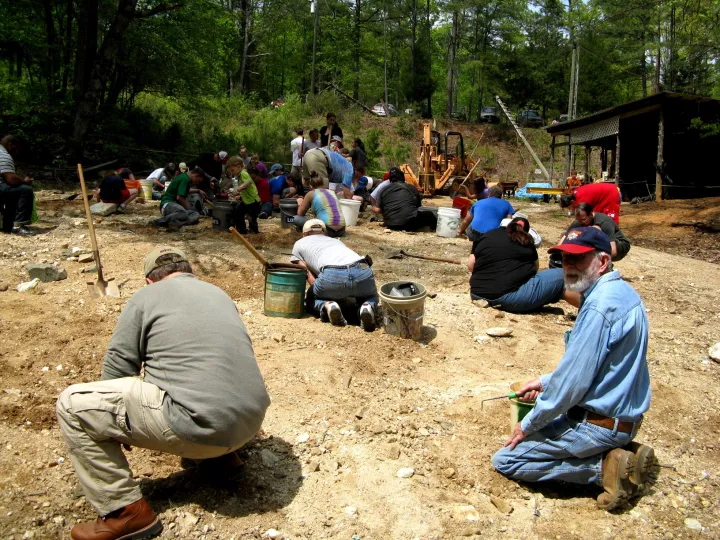
Rockhounding is an exciting hobby enjoyed by many. While public lands offer ample opportunities for collecting, exploring private land can open up a whole new world of geological treasures. But when it comes to rockhounding on private property, a unique set of rules and ethics come into play.
It is crucial to approach rockhounding on private property with respect, responsibility, and a clear understanding of etiquette. This guide will equip you with the knowledge and tools you need to access private land responsibly, ensuring that you can pursue your passion for rockhounding while maintaining positive relationships with landowners and preserving the natural environment.
Understanding Property Rights
Before you even think about picking up a rock on private land, it's crucial to understand the concept of property rights. Private property can encompass a wide range of land types, from farms and ranches to industrial sites and residential areas. Regardless of the type, the underlying principle remains the same: you cannot legally rockhound on private property without the express permission of the landowner.
Trespassing on private property, even with the intention of rockhounding, can have serious consequences. You could face legal charges, fines, or even damage your reputation within the rockhounding community. Always prioritize respecting property rights and following the law.
Why Rockhound on Private Property?
Venturing beyond public lands offers several unique advantages for rockhounds:
- Unique Finds: Private lands often contain minerals, rocks, or fossils not found on public lands due to different geological formations or historical land use.
- Less Competition: Fewer collectors typically frequent private property, increasing your chances of discovering high-quality specimens and experiencing a more secluded and peaceful rockhounding adventure.
- Controlled Access: Landowners can provide valuable information about the geology of their property, potential finds, and any specific areas where collecting is permitted or restricted.
Finding Private Properties for Rockhounding
Identifying potential private properties requires thorough research and networking. You can do this by:
- Researching Locations: Utilize local libraries, historical societies, and geological surveys to identify areas with rockhounding potential. Look for historical mining sites, known mineral deposits, and areas with unique geological formations.
- Join a Club: Some rockhounding clubs have established relationships with landowners and can help facilitate access for their members. Consider joining a local club to expand your network and access opportunities.
- Online Tools: Use online databases, geological maps, and property information websites. Websites like ours, Mindat.org, and a few others, provide geological information, while county property records can offer ownership details. Explore our private dig site map below to search for a private property near you available for rockhounding.
Obtaining Permission
The key to ethical rockhounding on private property is obtaining permission from the landowner. Here's how to approach the process:
- Identify the Landowner: Research property records or ask around the local community to determine who owns the land you're interested in.
- Make Contact: Reach out to the landowner via phone, email, or in person. Be polite, respectful, and transparent about your intentions. Explain your interest in rockhounding and ask for their permission to access their property.
- Offer Something in Return: Consider offering something in return for their generosity. This could be a share of your finds, help with a project on their property, or a small donation to a charity of their choice.
- Get it in Writing: If the landowner grants permission, ask if they would be willing to sign a simple agreement outlining the terms of your access. This can help avoid misunderstandings in the future.
Etiquette and Best Practices
Once you've obtained permission, it's important to follow proper etiquette and best practices to ensure a positive experience for both you and the landowner:
- Leave No Trace: Leave the property exactly as you found it (or better). Fill in any holes you dig, avoid disturbing vegetation, and stay on designated paths.
- Respect Livestock and Crops: Be mindful of livestock or crops on the property. Close any gates behind you and avoid disturbing animals or plants.
- Show Appreciation: Express your gratitude to the landowner for their generosity. A handwritten thank-you note or a small gift is a thoughtful gesture.
Legal Considerations
Familiarize yourself with the relevant laws and regulations regarding rockhounding in your area. Understanding the legal aspects can protect both you and the landowner. Some of the important pieces of legal considerations include:
- Liability and Insurance: Clarify liability issues. Some landowners may require you to sign a waiver absolving them of responsibility for any accidents. Consider having personal liability insurance.
- Waivers and Agreements: Be prepared to sign agreements that outline your responsibilities and the limitations of your access.
- State and Local Laws: Be aware of local and state laws regarding access and collecting. Some areas may have specific regulations about what can be collected and how. These laws can vary significantly, so it's important to do your research. Be aware of the difference between surface rights and mineral rights, as this can affect your ability to collect certain types of rocks or minerals.
Building Positive Relationships with Landowners
Good relationships can lead to long-term access and referrals:
- Communication: Keep in touch with the landowner, provide updates on your activities, and inform them of your findings. This helps build trust and transparency.
- Appreciation: Show appreciation through a thank-you note or a small gift. Acknowledging their kindness can go a long way in building goodwill.
- Long-Term Access: Building trust can lead to repeated access and even recommendations to other property owners who may allow rockhounding on their land.
Safety Tips
Always prioritize safety when rockhounding on private property. Be aware of potential hazards such as uneven terrain, wildlife, or weather conditions. Wear appropriate gear (check out our recommended gear below), bring plenty of water, and let someone know where you're
